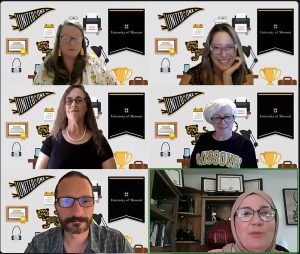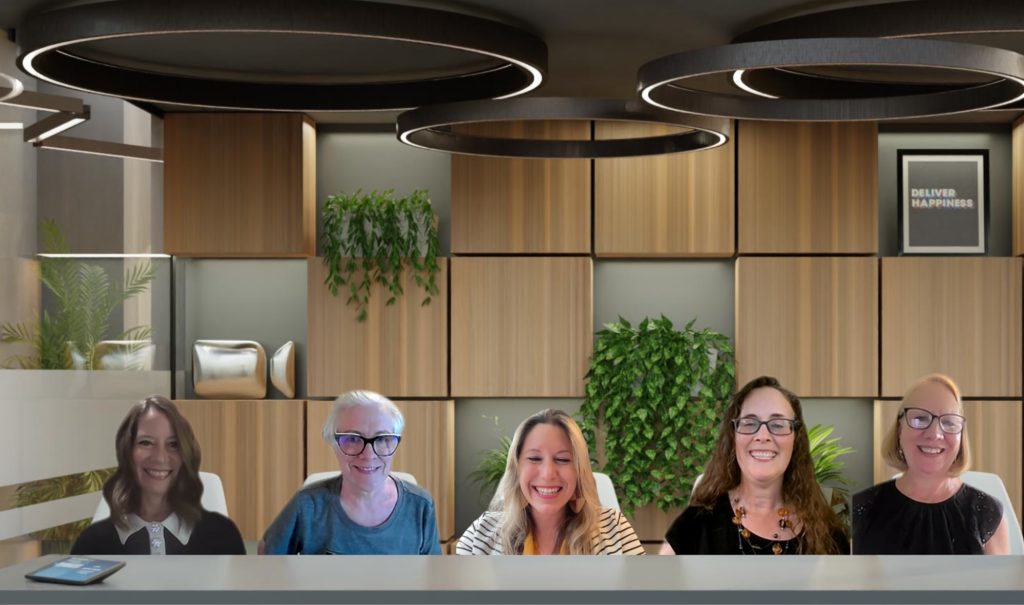Mizzou Academy Brings K-12 Expertise to the USDLA National Conference
Posted in: News
The United States Distance Learning Association (USDLA) was the first U.S. nonprofit learning association to support distance learning research, development, and practice in all areas of education, training, and communications. Its founding in 1987 marked an important milestone for leaders in distance education. Around the same time, Mizzou Academy was in the early stages of transitioning to online courses and later into an accredited, diploma-granting K-12 school. As an early member of USDLA, Mizzou Academy is proud to share this rich history of profound transformation in the educational landscape. Today, USDLA continues to lead and support distance learning through its publications, awards and recognitions, and a professional community that gathers annually for its national conference.
This year (2024) we were proud to have a team of seven educators representing Mizzou Academy at the USDLA national conference. Led by Ericca Thornhill and Dr. Kathryn Fishman-Weaver, this team included Karen Scales, Dr. Sherry Denney, Alicia Bixby, Kimberly Kester, and David Prats Vidal.
Ericca Thornhill, our division chair for sciences, first read the call for proposals for the national conference and immediately thought of the Mizzou Academy team’s expertise. She also knew that participating in these professional events would further her own growth as an educator. “I wanted a connection to this national organization,” she said, and “to build my skills in asynchronous teaching. I’m still learning, and always on the lookout for good, motivating, and engaging activities and lesson planning, so this was helpful.”
Drawing on the experiences of our global lab school, Mizzou Academy representatives facilitated two dynamic panels at the conference. The first was a panel focused on fostering student service and leadership, and the second focused on supporting multilingual learners. Both drew on best practices for online and blended learning in K-12 education.
Fostering Service and Leadership
Mizzou Academy has a deep commitment to service and reverence for the power of student leadership. This is reflected across our curriculum and instructional practices. Examples include aligning content to the United Nations SDGs, engaging in school-wide service initiatives, and the annual leadership through service projects that our National Honor Society students plan and implement. This first panel encouraged educators to think deeply about the broader impact skills we teach in schools.
The guiding questions for this panel included:
- What leadership and agency skills do you hope to foster in your K-12 programs?
- What strategies and best practices have you integrated into your online programs?
- Tell us about a student project that particularly inspired you. What challenge did the young person hope to solve, and how did they approach it?
- What advice do you have for other online educators seeking to expand service and leadership in their programs?
Panelists shared learning activities, strategies, and stories of student leadership projects. Executive Director Kathryn Fishman-Weaver who moderated the panel said, “We shared stories about our student leaders who are working on issues of food and housing insecurity, access to healthcare and education, mental health and wellness, and environmental advocacy. These students inspire us and are impacting change in their communities”
Below is a fun photo of this panel, taken using immersive view on Zoom.

Supporting Multilingual Learners
Over the past few years, Mizzou Academy has welcomed students from over 60 different countries. At their accreditation report last spring, Mizzou Academy reported that 90% of their students speak a home language other than English.
While Mizzou Academy is a global school, multilingual learners are also a fast growing population in the United States. According to the National Education Association, “By 2025, 1 out of 4 children in classrooms across the nation will be an English learner (EL).”
In this panel, moderated by Ericca Thornhill, panelists shared strategies for supporting and celebrating multilingual learners in the online and blended classroom. The team discussed the following questions and then facilitated a conversation on multilingualism, global citizenship, and best practices in online and connected learning.
The guiding questions for this panel included:
- What do you wish educators knew about supporting multilingual learners in the online classroom?
- How can you leverage the strengths multilingual learners bring to your programs?
- What specific tools have helped you to better connect with multilingual learners?
- What do you hope participants take away from this panel, and why? If you only give one piece of advice what would it be?
The engaging conversations encouraged educators to adopt an asset-based perspective to language learning, teaching, and relationship building. Among the experiences our panelists drew on, David Prats Vidal shared about chairing the Mizzou Academy world language department, which offers 23 different languages for students to study. Through these courses, students grow in their own world language competencies, becoming more able to build friendships and relationships across borders.
Much like Thornhill had anticipated when she reached out to our team about presenting, Prats Vidal found the experience of participating in the USDLA conference professionally rewarding. “I must admit I was feeling a bit of stage fright in the moments leading to the panel, but from the moment it started it all went away because I felt part of a well-oiled machine. From the introductions to the questions, everyone was doing their part and involving the rest of the team in the conversation.”
Key Takeaways for Praxis
The two panels were well received, and USDLA has shared that they may make videos of both panel discussions available on USDLA TV in the coming months. These conversations also highlighted many of our core commitments and beliefs at Mizzou Academy including:
- Empathy is leadership. Service is leadership.
- Student voice and choice build impact and engagement.
- Diversity is a strength.
- Whether online or in-person, relationships are the heart of great teaching.
Our conversations about language and leadership also affirmed what distance educators have long understood: That “the classroom” is all around us, and we never stop learning. That when our students are building language skills, they are building communication skills. That when they learn and practice critical thinking, they begin to recognize the leaders they already are and can grow to be. And that as they do, our students so often turn out to be our own best teachers.